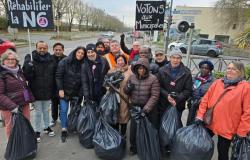The decision of Meta (Facebook, Instagram, WhatsApp) to cease its fact-checking program in the United States worries many media around the world: what future for these fact-checking practices, at a time of multiplication of falsehoods news ?
• Also read: The Pope castigates an era of “fake news” and warns against the excesses of AI
• Also read: Paris expresses ‘concern’ after Meta’s fact-checking stops
• Also read: Meta ends fact-checking in the United States: soon “free-for-all” in Canada, according to experts
So far expanding
Having become a journalistic format in its own right, fact-checking developed in the early 2000s in the United States thanks to the Internet and under the impetus of media keen to confront the words of political figures with reality, like the PolitiFact site, launched in 2007 and winner of the Pulitzer Prize in 2009.
Correction of figures live on television, online articles crossed out with the words true or false… the method spread all over the world, until the shift that occurred in 2016 with the election of Donald Trump and Brexit.
Pointed out because of the flood of false information and conspiracy theories on social networks, web giants like Meta then encouraged the growth of verification programs beyond the political sphere. They relied on media who saw it as a welcome financial windfall in a difficult economic context.
Vital resources for certain media
Ten organizations are affected by Meta’s announcement, which at this stage only concerns the United States. Some are totally dependent on the Tech giant, like Check Your Fact, reports the American media Business Insider. Other entities seem more sheltered, including PolitiFact: it derives a little more than 5% of its revenues from the partnership with Meta, according to the New York Times.
Agence France-Presse is on the front line globally. She participates in more than 26 languages in a Meta program that pays more than 80 media outlets around the world to use their fact-checking on Facebook, Instagram and WhatsApp. “We are currently assessing the situation,” indicates the agency’s management.
The issue is sensitive in Africa. “Economic models are completely modeled on Facebook”, including Africa Check based in Dakar, Data-Check in Cameroon, quotes Laurent Bigot, assessor at IFCN, an international fact-checking network. And to warn, in the event of an end to financing by Meta on this continent: “This verification work will never be done elsewhere. But disinformation kills every day in these countries.”
Target of criticism
In support of his dramatic decision, Meta boss Mark Zuckerberg claimed that “fact checkers have been too politically oriented and have done more to reduce trust than to improve it, particularly in UNITED STATES”. Thus “we are restoring free expression on our platforms,” he asserted.
Owner of
However, retorted Angie Holan, director of the IFCN network bringing together 137 organizations, this journalism “has never censored or removed publications”. “Fact-checkers add information and context to controversial statements” by “following non-partisan and transparent principles,” she recalled.
Pressure and even threats on digital investigation teams often increase during electoral periods, as was the case in 2024 in India, South Korea or Croatia. With Meta’s new policy, the NGO Reporters Without Borders is worried about an “anti-journalistic headlong rush”.
Fact-checking has not said its last word
Filipino journalist and Nobel Peace Prize winner Maria Ressa is alarmed: Facebook will, according to her, “allow lies, anger, fear and hatred to infect every person on the platform” and this could lead to , ultimately, to a “world without facts”.
Expert Laurent Bigot qualifies: “Meta’s announcement only puts an end to an abnormal situation.” Because “the platforms convey a maximum of disinformation and buy a good conscience with this type of programs”, according to this lecturer in information and communication sciences at the French University of Tours.
The French daily Libération ended its partnership with Meta in 2021. Head of its Checknews section, Cédric Mathiot considers that such contracts can constitute “an economic crutch which does good” and, at the same time, which “perhaps prevents” to “revitalize” the fact-checking process. Without Meta, “paradoxically, this can push fact-checking to be more ambitious,” with in-depth investigations and “more varied” themes, he argues.





